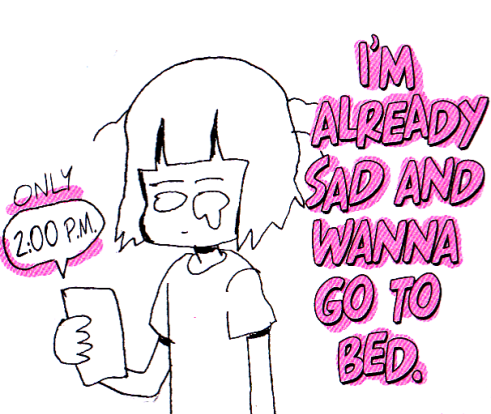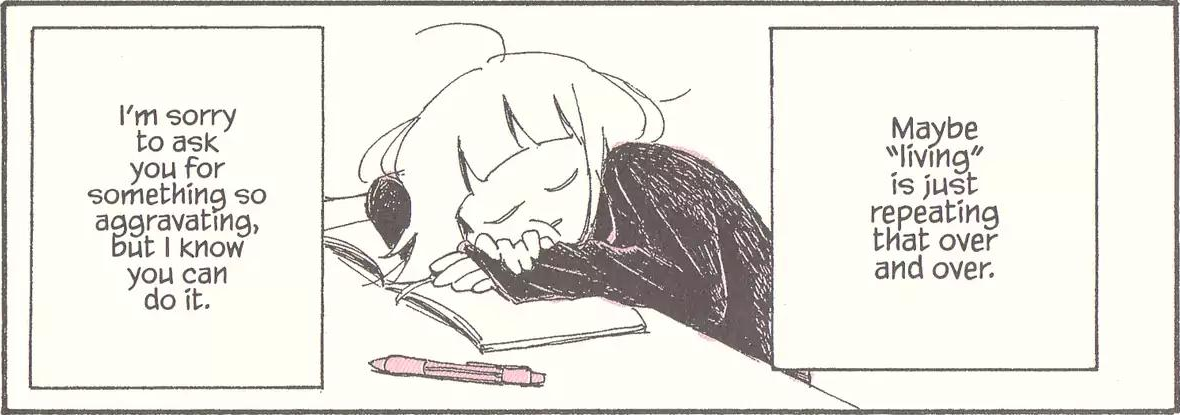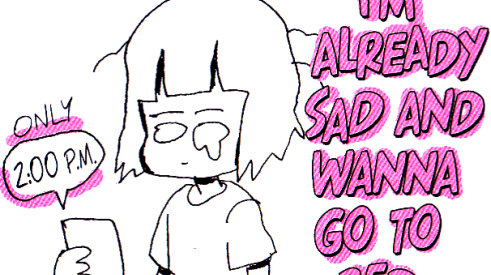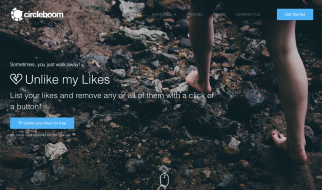
Nagata Kabi is a very atypical manga artist. For one thing, she publishes her work on Pixiv and other social media platforms, outside of the world of demographic-oriented anthology magazines that spawn most of the manga which makes it over to the West. Nagata?s work is also unusual in that it?s autobiographical, a genre experimented with by some of manga?s pioneers (such as Shigeru Mizuki?s war memoirs) but mostly pushed out of the commercial space. While most manga is published in black and white, she includes splashes of colour, mostly pink.
But even without these commercial caveats, Nagata?s work would still be distinctive. She writes from a brutally honest, marginal perspective. She?s a young, socially-maladjusted woman who struggles to adapt to the world of work and social relations. Nagata is frank about her mental illness as well as her homosexuality, two subjects which are still taboo in Japan. Instead of discussing these issues issues moralistically, Nagata delves deep into her own psyche and thought process.
Autobiographical comics are, however, a long tradition in North American alternative comics, going back to the pioneering work of Justin Green and continued into the 1980s and 90s by people like Harvey Pekar, Art Spiegelman, Joe Matt and Julie Doucet. There are still people doing autobiographical comics in North America, and good ones, but I think of Nagata as the unlikely heir to this tradition: creating unvarnished tell-all stories that express the secret, unflattering desires and feelings that readers might relate to but not want to admit to.
Much of the Western reception for Nagata?s first memoir, My Lesbian Experience with Loneliness, focused on its depiction of Nagata?s lesbianism. It was often paired with the first volume of My Brother?s Husband, the manga which confirmed that Anderson Cooper loves musclebound Canadian men. But whereas My Brother?s Husband is largely about the question of tolerance for homosexuality, Nagata?s real concern is on the other two nouns: experience and loneliness.
Nagata?s follow-up work, thus far released in two volumes in English, continues this focus, as signaled by the title My Solo Exchange Diary. In essence, she revives a childhood tradition of writing pen-pal letters to herself: an expression of fundamental loneliness, of crafting an ersatz version of the relationships you wish you had. We return briefly to the lesbian escort agency from the previous volume, but the story deals chiefly with Nagata?s strained relationship with her family, who she moves in and out with.
I?m not someone who generally reads books to relate to them ? I prefer a kind of baroque formal remove. But these books strike me to the core. Like Nagata, I?ve spent my adult life shuttling between tiny one-occupant apartments and parents? spare bedrooms. I?ve always found human interaction somewhat baffling. As a teenager, I was diagnosed with Asperger?s syndrome, which is now just called being on the autism spectrum ? although I don?t like to think of myself as autistic or disabled. I?ve also had my own struggles with depression since adolescence.
I spend a lot of time by myself, and a lot of time in my own head. Like Nagata, I?m well aware of the toxicity of my own thought processes, but find myself helplessly beholden to them. I share this disconnect she feels with other people, and the way she finds others? thoughts and feelings utterly opaque ? even friends and family.

The push-pull relationship Nagata has with her parents was also familiar to me. Her in-text persona moves in and out with her parents, torn between the desire for independence and the longing for their approval and affection. This is also a struggle I?ve had, although financial and cultural differences change the character of it somewhat. Maybe being autistic, or being depressed, or both, is constantly feeling uncomfortable with the social categories and requirements of being either a child or adult.
A casual reading of My Lesbian Experience with Loneliness could lead one to think that Nagata?s coming to grips with her own sexuality resolved her issues with anxiety and depression. What?s so valuable about My Solo Exchange Diary is that it shows how mental health is an ongoing, perhaps unending struggle. Nagata experiences some of her worst problems, including a bout of depressive alcoholism that leads to her hospitalization, after she ?comes out? and has some romantic success.
The kind of celebrity confessionals we see around World Mental Health Day and similar awareness-based holidays always ring hollow to me. What do I care if Howie Mandel has depression? The rich and famous telling me it gets better doesn?t help people like me for whom it empathetically isn?t. If anything, it makes my own struggles feel alien to me, like they too have been taken over by the media like so much else. The cutesy mental health stuff you see on Twitter doesn?t appeal to me either ? a cartoon character saying ?you?re great and you?re going to be okay? just makes me think ?if they knew me, they?d never say that.? But somehow, when Nagata Kabi shows how she struggles despite having success as a manga artist, it feels real and convincing to me.
But then again, what is the use of identification? Nagata?s work doesn?t offer me a solution to my problems ? she doesn?t even have a solution to hers. Even if we?re of similar age, the gap between a white straight Canadian guy who charitably calls himself a freelance writer and a Japanese lesbian manga artist means I can?t exactly retrace her steps. (Somehow I think that visiting an escort agency wouldn?t be seen as positive a solution for me, although Chester Brown might disagree.) So what good does reading these comics and going ?I feel that? do?
In the end, it does make me happier ? or at least less lonely. I feel less alien, less like my thought processes are fundamentally wrong. I gain a bit of a vocabulary for talking about that strange inner circuitry. And maybe that?s all art can aspire to.


